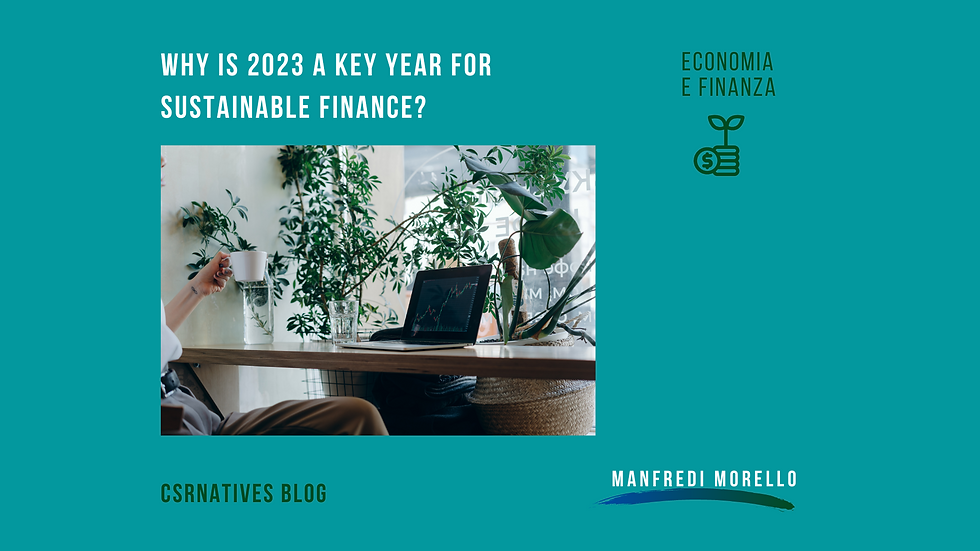2023: Revolutionizing Sustainable Finance - Unveiling Groundbreaking Regulations for ESG Ratings
- CSRnative
- 26 giu 2023
- Tempo di lettura: 3 min
Aggiornamento: 24 mag 2024
2023 is being hailed as the year of sustainable finance, as discussed in our previous article [1]. It has seen significant advancements in addressing the structural issues plaguing the ESG (Environmental, Social, and Governance) market. One notable development is the ongoing debate between the "woke" movement and corporate America in the United States [2], which has been limited by the efforts of the Securities and Exchange Commission (SEC) and the long-term sustainable investing plans of the Biden Administration on clean energy [3]. Academic articles are now featuring headlines such as "aggregate confusion" and "the end of ESG," capturing the current discourse. The former title [4] highlights a remarkable study conducted by MIT academics, which delves into the divergence of ESG ratings. The latter [5] represents the integration of ESG into mainstream academia. In 2022, a global consultation initiated by IOSCO called on national authorities to advance regulations pertaining to ESG ratings [6] and the British HM Treasury followed suit this year [7]. Additionally, the European Commission – who had launched the stakeholders’ consultation in June 2022 - has responded institutionally with the first ever proposal for a regulation on ESG ratings in Europe. Let’s delve into this.
The proposed regulation encompasses a wide range of unprecedented novelties. Firstly, the impact assessment has led to the adoption of the most stringent policy choice[8]. This presents a unique opportunity for the European Union (EU) to deliver a comprehensive institutional response and foster a well-functioning ESG rating ecosystem within the Single Market. The European Securities and Markets Authority (ESMA) will be entrusted with the task of meticulously listing authorised and single-product ESG rating agencies operating in the EU. This approach aims to benefit companies, investors, citizens, and society at large by establishing a well-regulated and supervised market.
In an effort to level the playing field, consultancy services will be prohibited. On the one hand, this measure aims to eliminate barriers for smaller providers, whose market share could have been threatened by larger operators inflating their revenues through costly auxiliary activities for companies. On the other hand, rating agencies will be required to disclose their procedures and methodologies to eradicate conflicts of interest. This significant progress will undoubtedly be appreciated by companies as it enhances transparency and credibility in the ESG rating process – as underlined by the Research Office Director of Standard Ethics, Mr Schettini Gherardini [9].
Furthermore, a notable aspect of the ongoing discussion revolves around the role of Credit Rating Agencies (CRAs). As part of the regulatory efforts, CRAs are now required to incorporate ESG considerations into their credit assessments. However, it is crucial to maintain focus on their primary mandate, which is to evaluate default risk. Therefore, while ESG factors are rightfully being integrated into their methodologies, it is important to acknowledge that, for CRAs, ESG considerations will remain an additional facet alongside the core credit analysis – as previously noted [10]. To address potential concerns of market concentration, an instrumental provision has been introduced to separate ESG ratings from ESG addenda in the realm of Credit Ratings. This forward-thinking approach serves as a preemptive measure, ensuring that the ESG rating market does not become monopolistic or dominated by a few key players. Such a safeguard is a significant achievement for the comprehensive EU-wide regulatory framework.
By striking a delicate balance between incorporating ESG considerations without compromising the fundamental assessment of default risk, the regulatory measures aim to foster a harmonized and robust market environment. These milestones represent a vital step towards establishing a well-regulated and effective ecosystem for sustainable finance within the European Union with a foresight on a Sustainable, well-integrated Single Market.
Sources:
[1] M.Morello (2023) “Why is 2023 a key year for Sustainable Finance?”. CSRNatives Blog. URL: https://www.csrnatives.net/post/why-is-2023-a-key-year-for-sustainable-finance
[2] Financial Times (2022) “‘Anti-woke’ and sin ETFs could get caught up in SEC rules scrutiny”. FT.com - URL: https://www.ft.com/content/26ce80e6-fcfb-4dff-a565-bd7e23ee364b
[3] White House (2023) “Biden-Harris Administration Announces Largest Investment in Rural Electrification Since the New Deal”. URL: https://www.whitehouse.gov/briefing-room/statements-releases/2023/05/17/what-they-are-saying-biden-harris-administration-announces-largest-investment-in-rural-electrification-since-the-new-deal/#:~:text=Yesterday%2C%20the%20Biden%2DHarris%20Administration,their%20communities%20across%20the%20country.
[4] Berg F., Kolbel J., and Rigobon R. “Aggregate Confusion: The Divergence of ESG Ratings”. URL: https://deliverypdf.ssrn.com/delivery.php?ID=255100081087114095124127119010000023016039060039010087100112103070068088029100065022019117103061008030027118125028097097093075043075078051054004005104026101090114105003079016086015090028103018123087000115006004097079076012068100093125102087123082003027&EXT=pdf&INDEX=TRUE
[5] Edmans A. “The End of ESG”. Financial Management. Draft 4 January 2023. URL: https://deliverypdf.ssrn.com/delivery.php?ID=370115027092012124122095031075086094103033031041027010022026000096092118026113124067057030039061008116026029081118022069114089049074003041085023113118067067018071004083020027113029105068091074108072112026096022107076013088065124090011025088104083017&EXT=pdf&INDEX=TRUE
[6] HK Green Finance Blog (2021) “IOSCO consults on ESG Ratings and Data Providers”. URL: https://www.hkgreenfinance.org/iosco-consults-on-esg-ratings-and-data-providers/?lang=zh-hans
[7] Ashurst (2023) “ESG data and ratings providers the regulatory net has been cast”. URL: https://www.ashurst.com/en/insights/esg-data-and-ratings-providers-the-regulatory-net-has-been-cast/
[8] European Commission (2023) “Executive Summary of the Impact Assessment Accompanying the document Proposal for a Regulation of the European Parliament and of the Council on the transparency and integrity of Environmental, Social and Governance (ESG) rating activities”. URL: https://ec.europa.eu/finance/docs/law/230613-summary-impact-assessment_en.pdf
[9] Teleborsa.it “Rating ESG, UE vuole più trasparenza e fiducia. Ma valutazioni restano al mercato”. URL: https://www.teleborsa.it/News/2023/06/20/rating-esg-ue-vuole-piu-trasparenza-e-fiducia-ma-valutazioni-restano-al-mercato-41.html#.ZJGILHZByUk
[10] Morello M. (2021) “Will Credit Rating Agencies take over ESG Rating Agencies?”. CSRNatives Blog. URL: https://www.csrnatives.net/post/will-credit-rating-agencies-take-over-esg-rating-agencies



Commenti